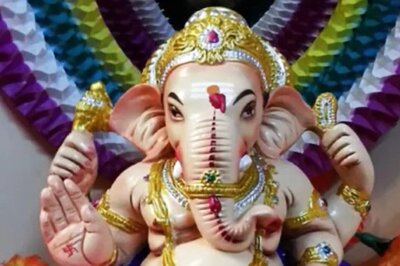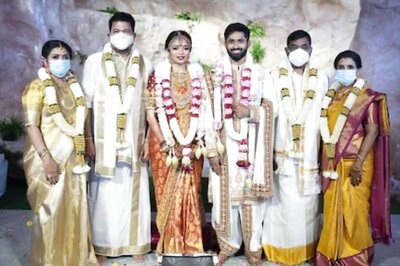
views
At seven in the evening, Suvendu Adhikari looks like he just got ready for the day. The 41-year-old Lok Sabha member from Tamluk sports a crew cut and a well-groomed appearance. Adhikari is just about to begin a little durbar at the Contai municipal office, about 150 km from Kolkata. But before that, he switches on the television to watch himself on a private channel viciously attacking the Communist Party of India (Marxist), commonly known as the CPM, which has ruled West Bengal for so long that its ways have seeped into the genetic code of the state.
“The people of West Bengal will throw the Left out in the coming elections,” Adhikari tells Forbes India with undiluted venom in his voice. Adhikari belongs to the Mamata Banerjee-led All India Trinamool Congress party (TMC) and was the party’s spearhead in the Nandigram campaign against forcible acquisition of agricultural land by the state.
After a four-year siege, the TMC and the Congress Party are preparing for the final and most ambitious political assault on the Left fortress that has held for nearly three-and-a-half decades. Many in the state believe that TMC has a fair chance this time, not so much because voters favour them, but because of a simmering discontent among an entire generation of Bengalis that has not seen anything other than the increasingly arrogant CPM in power.
The Left government led by Jyoti Basu that came to power in 1977 vanquished Bengal’s landowning elite with reforms ensuring security of tenure to over 1.5 million sharecroppers and redistributing land among peasants. Jyoti Basu went on to become India’s longest-serving chief minister until he stepped down in 2000. “There is no before and after situation for the youth,” says D. Bandyopadhyay, widely known as the designer of Operation Barga, India’s most successful land reforms ever. Bandyopadhyay, who is now a TMC supporter, says they see Banerjee as an alternative. Also, land is back at the centre of West Bengal’s electoral politics but this time, it is the TMC that holds the trump card.
It is ironic that perhaps Banerjee’s fortunes turned for the better on the day that the cricket-loving Buddhadeb Bhattacharjee was sworn in as chief minister in 2006. The now 67-year-old Bhattacharjee’s first announcement after taking over was the Tata Nano plant in Singur. The 1,000-acre piece of land earmarked for the factory immediately became her political platform from which she whipped up a campaign that took the state by storm, helping her avenge TMC’s decimation in the assembly polls as well as in the Lok Sabha elections earlier.
In the 2004 Lok Sabha polls, didi (elder sister), as she is popularly known, was the only one from her party to make it to Parliament. But the Singur and Nandigram upheavals helped the TMC come back strongly, winning 19 Lok Sabha seats in 2009 and later sweeping the civic body polls in 2010, capturing major corporations such as Kolkata and cracking open the red bastions of Hooghly and North 24-Paraganas. “It is appreciated that Banerjee is honest, a fighter and a self-made woman,” says Abhirup Sarkar, who teaches economics at the Indian Statistical Institute (ISI) in Kolkata.
Banerjee leads an austere lifestyle. Always clad in simple cotton saris without any jewelry or make-up, she is known as much for her tantrums as her political fortitude. She once threw her shawl at Ram Vilas Paswan in Parliament saying he had ignored Bengal in his Railway Budget. On another occasion she caught a Samajwadi Party Member of Parliament (MP) and dragged him out of the House for opposing women’s reservation. Her rough and tumble politics, she has said, is the only answer to the CPM, whom she accuses of using state power and violence to crush opposition.
Gautam Deb, a CPM central committee member and minister of housing in the state is known for openly criticising some of his party’s ways. He says the CPM suffered because of its high-handedness, corruption and ignoring the opposition. “You cannot ignore the opposition when 50 percent of people voted for them,’’ Deb says, smoking a Navy Cut that he has bummed off a colleague. “In a democracy, we should have the courage to engage with others.’’
CPM Politburo member and state industries minister Nirupam Sen says that the land acquisitions did create some confusion among farmers. “There was a sense of alienation among minorities and workers of the unorganised sector,” says Sen, a lanky man with a thoughtful demeanour who joined the party 45 years ago.
The discontent could well catapult the TMC to power but its vision for the state is still hazy. Banerjee herself is a mercurial leader and not known to be a great administrator. The Indian Railways has performed poorly on her watch and its finances have deteriorated. Many fear she could be more left than the Left. Some Kolakata-based Gujarati businessmen and traders whom Forbes India spoke to, say that they did not know what to expect from her. “I oppose the Left Front but I am not against the Left ideology,’’ she said in February.
Partha Chatterjee, the portly leader of opposition in West Bengal, says the party’s focus will be on information technology and services. The TMC continues to oppose forced acquisition of land which means it will not be easy to set up large factories.
“The size of land required for a plant will be decided by the government,” Chatterjee says. While we are there, a middle-aged woman has come to complain about her elder sibling who has thrown the family out of the family house. The local police have done nothing because he is a CPM member. He instructs his aide to talk to the authorities and sort it out. It may not be as easy for Chatterjee, who may land the industries portfolio, to solve the state’s problems.




















Comments
0 comment